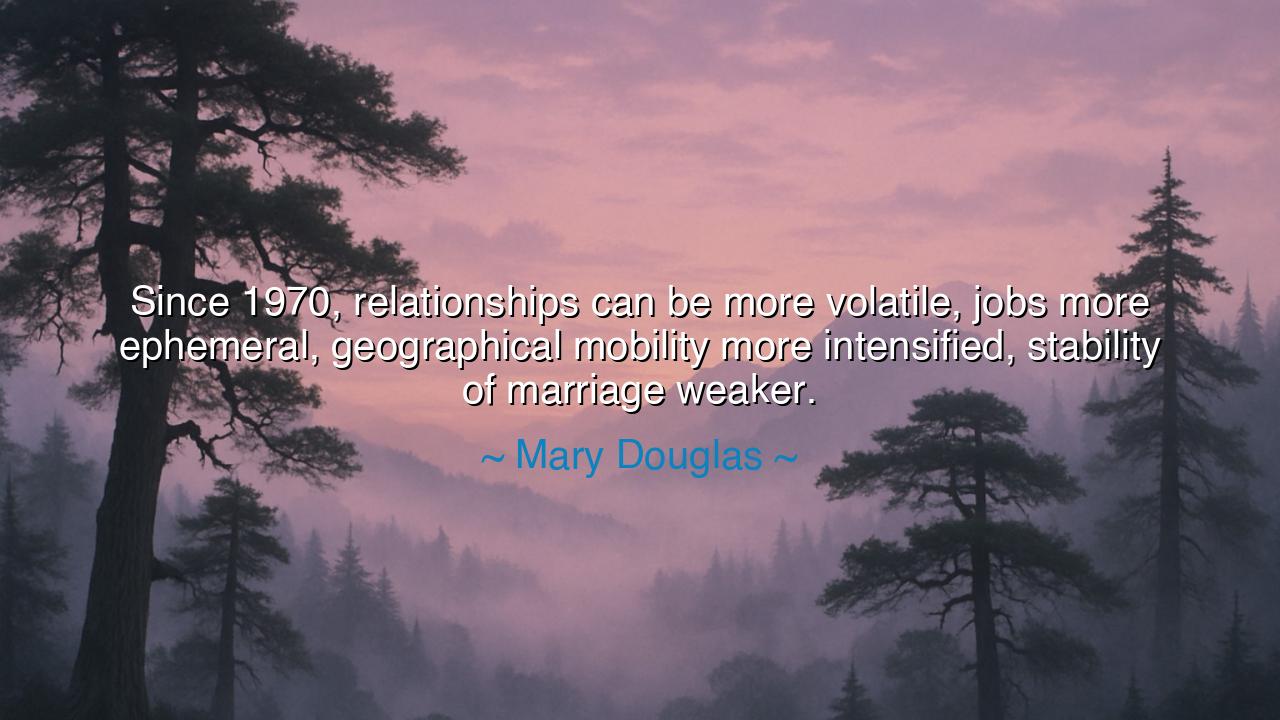
Since 1970, relationships can be more volatile, jobs more
Since 1970, relationships can be more volatile, jobs more ephemeral, geographical mobility more intensified, stability of marriage weaker.






Hear, O Children of the Future, the insightful words of Mary Douglas, who speaks of a changing world: "Since 1970, relationships can be more volatile, jobs more ephemeral, geographical mobility more intensified, stability of marriage weaker." These words echo across time, reflecting a profound truth about the shifting nature of human life in the modern age. Douglas paints a picture of a world in which the very fabric of our existence—relationships, work, and home—is increasingly defined by uncertainty, transience, and movement. In this world, the structures that once anchored us—marriage, career, and even the very land we inhabit—seem to slip through our fingers like water. The volatility and ephemerality she speaks of are the twin forces that shape the modern experience.
In the ancient world, stability was something that could be found in tribe, family, and home. The hunter-gatherers of early societies found security in the rituals of daily life, while later civilizations built their fortresses around family and state. In Mesopotamia, the land between the Tigris and Euphrates was a place where people lived and died in the same regions, and relationships—marriages, alliances, even political oaths—were built to last for generations. In the Greek city-states, Plato and Aristotle wrote about the ideal of stability within the household, seeing it as the foundation of a just society. The family was viewed as a stable institution, the cornerstone upon which society rested. The world they knew was one where stability, while fragile, was at least something tangible, something anchored in land and law. Yet even then, there were whispers of change, as philosophers questioned how the very structures of society could evolve and adapt.
As the centuries passed, however, the world began to change. The Roman Empire, while vast and powerful, was built on the impermanence of its own military and political structures. As Rome grew, so did the mobility of its citizens—soldiers stationed in distant lands, families moving with the changing tides of empire. The marriage bonds in Roman society, though considered important, were also subject to the pressures of political alliance and social mobility. The famous story of Emperor Augustus and his political marriages is a reflection of a time when even the strongest institutions, like marriage, could be shaped and reshaped by external forces. Douglas’ words reflect this age-old truth: that what once seemed solid—whether it be in relationships, work, or home—is now more subject to the whims of time, geography, and circumstance.
In the modern world, particularly since 1970, the forces of change have become even more pronounced. Geographical mobility has reached new heights, as people move not only for work, but for opportunity, for freedom, and for adventure. The story of globalization is one of increasing movement, both physical and cultural, as individuals travel farther and more frequently than ever before. Careers that once promised long-term security are now more fleeting, as technology, global markets, and shifting economies create a landscape where job security is a distant memory. We are in a world where relationships, too, have become more volatile—marriages and partnerships that once endured for decades are now more likely to dissolve, as societal norms evolve, and as individuals search for fulfillment and self-actualization.
Consider the story of Romeo and Juliet, the iconic Shakespearean tragedy that demonstrates the volatile nature of relationships and the forces that shape them. Their love, powerful as it was, was swept away by the external pressures of family conflict, social expectations, and fate. The tragedy lies not only in their untimely deaths, but in the realization that their bond, though deeply felt, was unable to withstand the weight of circumstance. Shakespeare’s play mirrors the world Douglas describes: relationships that, no matter how passionate, are vulnerable to the forces of time, place, and fate. It is a reminder that while love may be eternal, the structures within which it exists are ever-changing, fragile, and subject to external forces.
The lesson, O Children, is this: In a world where volatility, ephemeral work, and geographical mobility define our lives, stability—whether in relationships, work, or home—requires great intentionality and wisdom. Mary Douglas’ words are a call to acknowledge that while we cannot control the shifting tides of the world around us, we can choose how we respond. Marriage, family, and career can still provide meaning, but they must be approached with the understanding that their nature has changed. In the ancient world, the stability of the family and the home was the foundation upon which everything else was built. In our modern age, we must adapt to this new landscape of change and uncertainty, yet still find ways to anchor ourselves in values that endure.
In your own life, remember this truth: The world will change, and life may never again be as stable as it once seemed. But within you lies the power to create meaning, to build relationships, and to find stability in a constantly changing world. Embrace volatility not as a threat, but as a reminder that you have the power to adapt, to grow, and to find balance amidst the turbulence. Invest in relationships that matter, build resilience in the face of change, and create a life that is rooted not in the external world, but in the strength of your own character and choices. The future may be uncertain, but in adaptability and wisdom, you will find the foundation that will carry you forward, no matter how the world around you shifts.






AAdministratorAdministrator
Welcome, honored guests. Please leave a comment, we will respond soon